
BMJ Open Quality
Scope & Guideline
Fostering collaboration for a healthier tomorrow.
Introduction
Aims and Scopes
- Quality Improvement Methodologies:
The journal emphasizes the use of various quality improvement methodologies, including Plan-Do-Study-Act (PDSA) cycles, Lean management, and Six Sigma, to enhance healthcare practices. - Patient Safety Initiatives:
A core focus is on patient safety, with studies aimed at reducing adverse events, improving reporting systems, and fostering a culture of safety within healthcare settings. - Interdisciplinary Collaboration:
BMJ Open Quality highlights the importance of interdisciplinary approaches in quality improvement, encouraging collaboration among healthcare professionals from various fields to achieve better outcomes. - Implementation Science:
Research often explores the implementation of evidence-based practices in real-world settings, assessing barriers and facilitators to change and the sustainability of interventions. - Patient-Centered Care:
The journal promotes research that enhances patient-centered care, including studies on patient involvement in quality improvement processes and the use of patient-reported outcomes. - Health Equity:
There is a consistent focus on addressing health disparities and promoting equity in healthcare delivery, ensuring that quality improvement initiatives are inclusive and accessible to all populations.
Trending and Emerging
- Digital Health Technologies:
There is an increasing focus on the integration of digital health technologies in quality improvement initiatives, such as telemedicine, electronic health records, and mobile health applications. - Patient Engagement and Empowerment:
Research is trending towards enhancing patient engagement in their care processes, with studies exploring how to effectively involve patients in decision-making and quality improvement efforts. - Mental Health and Wellbeing:
Emerging themes highlight the importance of mental health and wellbeing within quality improvement frameworks, focusing on initiatives aimed at improving mental health services and support systems. - Data-Driven Quality Improvement:
The use of big data and analytics is on the rise, with studies examining how data can inform quality improvement strategies and enhance decision-making processes in healthcare. - Sustainability in Healthcare Practices:
There is a growing emphasis on sustainability within quality improvement initiatives, addressing environmental impacts and promoting practices that ensure long-term viability and health outcomes. - Health Equity and Social Determinants of Health:
Emerging research increasingly addresses health equity and the social determinants of health, focusing on interventions designed to reduce disparities and improve access to quality care.
Declining or Waning
- Traditional Audits and Reporting:
There is a noticeable decline in the publication of studies solely focused on traditional audit methods and reporting systems, as the field moves towards more dynamic and participatory quality improvement approaches. - Single-Site Studies:
Research limited to single-site studies is becoming less common, with a trend towards multicenter or collaborative projects that can provide broader insights and findings applicable across various settings. - Quality Improvement in Specific Conditions:
The focus on quality improvement initiatives targeting specific conditions, such as certain chronic diseases, appears to be waning, possibly due to the growing emphasis on comprehensive, system-wide approaches. - Pre- and Post-Intervention Studies:
There seems to be a decrease in studies that only present pre- and post-intervention data without a deeper exploration of the contextual factors influencing outcomes and sustainability.
Similar Journals
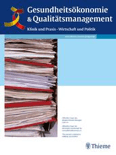
Gesundheitsoekonomie und Qualitaetsmanagement
Advancing Health Economics and Quality Management InsightsGesundheitsoekonomie und Qualitaetsmanagement, published by THIEME MEDICAL PUBL INC, serves as a vital resource in the field of health policy, particularly within the context of Germany. Since its inception in 1999, this journal has been committed to advancing the discourse on health economics and quality management, making significant contributions to understanding the complexities of healthcare systems. With an impact factor that reflects its ongoing importance, the journal is categorized in the Q4 quartile for Health Policy as of 2023, indicating its role in serving a niche yet crucial space in medical literature. Although currently not an open access journal, it remains accessible through various academic platforms, making its content available to a diverse audience of researchers, healthcare professionals, and students eager to engage with contemporary issues in health economics. With its publication continuing through 2024, Gesundheitsoekonomie und Qualitaetsmanagement is essential for anyone looking to deepen their understanding of the economic aspects of healthcare and ensure quality management in health services.
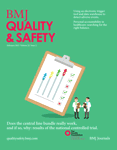
BMJ Quality & Safety
Advancing healthcare through impactful research.BMJ Quality & Safety, published by the BMJ Publishing Group, stands as a beacon in the fields of Health Policy and Medicine, with an impressive impact factor that signifies its leading role in advancing healthcare quality and safety research. The journal, which has been active since 2011, consistently ranks in the Q1 category for both Health Policy and miscellaneous Medicine categories, reinforcing its influence with a Scopus ranking of 16/310, placing it in the 95th percentile. With a commitment to open access, BMJ Quality & Safety enables widespread dissemination of knowledge, making cutting-edge research accessible to a global audience. Its contributions are vital for researchers, healthcare professionals, and students aiming to improve healthcare systems, policies, and practices worldwide. The journal's address in the esteemed British Medical Association House situates it at the heart of medical discourse in the UK, further enhancing its importance in an ever-evolving healthcare landscape.

Canadian Journal of Kidney Health and Disease
Fostering collaboration for a healthier future in nephrology.Canadian Journal of Kidney Health and Disease, published by SAGE Publications Inc, is a leading open-access journal dedicated to advancing the field of nephrology. Established in 2014, the journal aims to bridge the gap between research and clinical practice by disseminating high-quality clinical and experimental research findings, reviews, and case studies that focus on kidney health and associated disorders. With an impressive impact factor and ranked in the Q2 category for nephrology, the journal fosters an environment for interdisciplinary collaboration and innovation, enhancing the visibility of crucial advancements in kidney disease research. As an open-access journal, it ensures that valuable knowledge is accessible to researchers, healthcare professionals, and students globally, facilitating a deeper understanding of kidney health issues and promoting improved patient care. Located in the United Kingdom, the journal continues to expand its reach and influence within the nephrology community, leveraging its open-access model to encourage a diverse audience in exploring cutting-edge findings and sharing insights pertinent to kidney health.
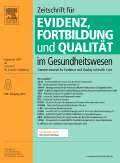
Zeitschrift fur Evidenz Fortbildung und Qualitaet im Gesundheitswesen
Fostering excellence in health education and practice.Zeitschrift für Evidenz Fortbildung und Qualität im Gesundheitswesen, published by Elsevier GmbH, serves as a pivotal platform for the dissemination of research and innovations within the realms of health policy, medicine, and education. Established in 2008 and continuing its impactful trajectory through 2024, this journal boasts a recognition as a Q2 journal in Education and positions itself within the Q3 tier for both Health Policy and miscellaneous Medicine categories, reflecting its dual focus on scholarly rigor and practical application. Despite not being an Open Access journal, it remains a valued resource for academics and practitioners, evidenced by its rankings: #214 out of 398 in Medicine (miscellaneous) and #829 out of 1543 in Social Sciences (Education) according to Scopus metrics. The journal's commitment to enhancing education and quality in healthcare makes it an essential read for researchers, professionals, and students seeking to stay abreast of the latest evidence-based practices and policies that shape health outcomes worldwide.
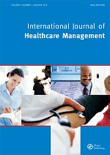
International Journal of Healthcare Management
Bridging theory and practice in health policy and leadership.The International Journal of Healthcare Management, published by ROUTLEDGE JOURNALS, TAYLOR & FRANCIS LTD, stands as a crucial platform for the dissemination of innovative research and insights in the realm of healthcare management. With a focus on health policy, leadership, and management, this journal aims to bridge the gap between theory and practice, providing a valuable resource for researchers, professionals, and students alike. It boasts an impressive Q2 ranking in Leadership and Management and a Q3 ranking in Health Policy for 2023, highlighting its influence and relevance within the academic community. With an accessible ISSN of 2047-9700 and E-ISSN of 2047-9719, the journal features an array of peer-reviewed articles that promote the advancement of knowledge and best practices in healthcare settings. While currently not offered as open access, the journal publishes high-quality research that underscores the importance of effective management strategies in enhancing healthcare outcomes. Positioned in the United Kingdom, the journal continues to contribute significant knowledge and frameworks that guide healthcare leaders and policymakers in navigating the complexities of governance in health services.
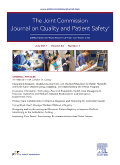
Joint Commission Journal on Quality and Patient Safety
Transforming patient care with cutting-edge insights.The Joint Commission Journal on Quality and Patient Safety is a leading publication in the field of health care quality and patient safety, under the esteemed auspices of Academic Press Inc Elsevier Science. With an impact factor reflecting its rigorous peer-review process and scholarly reputation, this journal aims to disseminate cutting-edge research, innovative practices, and effective strategies that enhance patient safety and healthcare delivery, making it an essential resource for researchers, professionals, and students alike. Operating without Open Access, the journal stands out with its impressive rankings in various Scopus categories, notably #4 in Nursing & Pediatrics and #10 in Nursing Leadership & Management, evidencing its significant impact in these fields. Since its inception in 2005, the journal has become a cornerstone for advancing knowledge and improving practices in healthcare settings, continuing to contribute to the dialogue on patient outcomes and quality improvement through 2024 and beyond. For practitioners and scholars dedicated to the advancement of healthcare standards, the Joint Commission Journal on Quality and Patient Safety remains a vital source of information and inspiration.

INTERNATIONAL JOURNAL OF RISK & SAFETY IN MEDICINE
Shaping the discourse on health risk and safety.INTERNATIONAL JOURNAL OF RISK & SAFETY IN MEDICINE, published by IOS Press, serves as an essential platform for advancing the understanding of risk and safety within the medical domain. With an ISSN of 0924-6479 and E-ISSN of 1878-6847, this journal has been dedicated to fostering critical discourse since its inception in 1990, reflecting a continuous commitment to the field through 2024. Positioned within the Q4 category in Health Policy and Q3 in Medicine (miscellaneous) and Public Health, Environmental and Occupational Health, the journal provides valuable insights, empirical research, and theoretical analyses that speak to the diverse challenges faced in medical safety and risk management. Although it operates under a subscription model, the journal remains a vital resource for researchers, healthcare professionals, and students alike, facilitating the exchange of innovative ideas and best practices in health risk assessment. With Scopus ranks indicating its role as a key contributor in its categories, the INTERNATIONAL JOURNAL OF RISK & SAFETY IN MEDICINE continues to shape the landscape of medical safety and policy discussions around the globe.
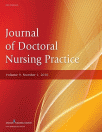
Journal of Doctoral Nursing Practice
Transforming practice with evidence-based nursing research.The Journal of Doctoral Nursing Practice, published by SPRINGER PUBLISHING CO, serves as an essential platform for the dissemination of innovative research and best practices in nursing and health policy. With its ISSN 2380-9418 and E-ISSN 2380-9426, this journal is committed to advancing the field through rigorous peer-reviewed articles that contribute to both theoretical and practical advancements in doctoral nursing education and practice. Since its inception in 2016, the journal has provided a vital forum for scholarly work, currently holding a prestigious ranking of Q3 in Nursing (Miscellaneous) and Q4 in Health Policy. The journal emphasizes the significance of nursing research in influencing health policy and outcomes, making it a critical resource for researchers, practitioners, and students alike who aspire to enhance nursing practices and healthcare systems. With no Open Access option, access to its high-quality content reflects a commitment to academic rigor and integrity, ensuring that the work published is both impactful and credible.

JOURNAL OF GENERAL INTERNAL MEDICINE
Connecting Research and Practice for Optimal Patient OutcomesJOURNAL OF GENERAL INTERNAL MEDICINE, a leading publication in the field of internal medicine, is published by Springer and boasts an impressive Q1 rank in internal medicine as of 2023, situating itself prominently at Rank #28 out of 167 in Scopus with an 83rd percentile. Since its inception in 1986, this esteemed journal has been at the forefront of disseminating high-quality research, clinical practices, and healthcare innovations that shape the landscape of internal medicine. The journal is recognized for its original research, systematic reviews, and practice guidelines that are essential for professionals navigating the complexities of patient care and clinical decision-making. With access options available, it serves as a critical resource for researchers, healthcare practitioners, and students alike, facilitating the enhancement of medical knowledge and evidence-based practice globally. The Journal's commitment to excellence is reflected in its ongoing contribution to advancing the field and ensuring that the latest findings reach those who need them most.
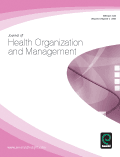
Journal of Health Organization and Management
Transforming health systems with evidence-based insights.The Journal of Health Organization and Management, published by Emerald Group Publishing Ltd, serves as a pivotal resource for professionals, researchers, and students interested in the intersection of health policy and organizational effectiveness. With an ISSN of 1477-7266 and an E-ISSN of 1758-7247, this esteemed journal has been charting advancements in health management since 2003, showcasing articles that reflect rigorous research and the latest trends in the field. Hailing from the United Kingdom, the journal has established itself within the upper echelons of academic literature, currently enjoying a Q2 classification in notable categories, including Business, Management, and Accounting, Health Policy, and Organizational Behavior and Human Resource Management, as of 2023. With impressive rankings in Scopus, including a percentile rank in the 62nd for Business and Management, it is an essential platform for disseminating innovative ideas and evidence-based findings crucial for enhancing health care systems globally. While it operates under a conventional access model, the journal remains dedicated to fostering scholarly dialogue and advancing the understanding of health organization complexities.